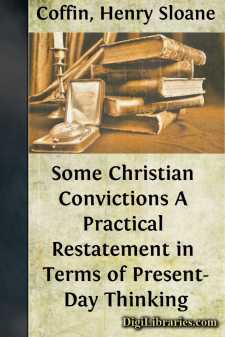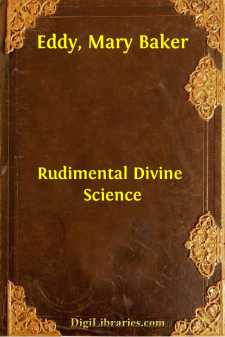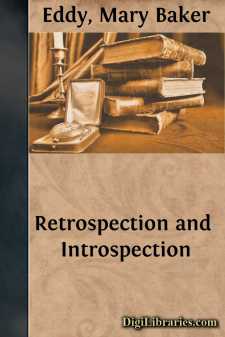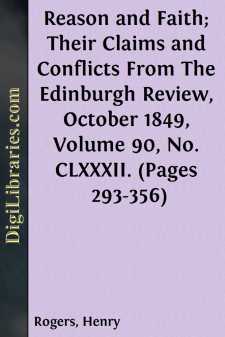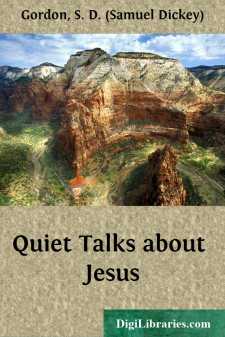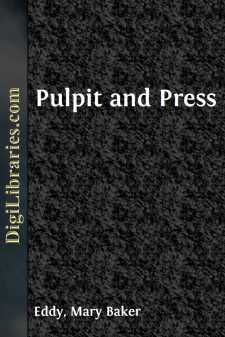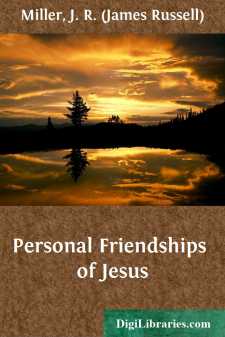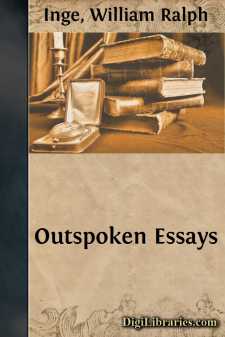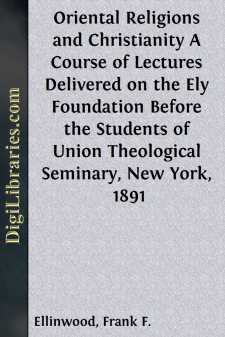Religion
- Agnosticism 2
- Antiquities & Archaeology 21
- Atheism 13
- Biblical Criticism & Interpretation 16
- Biblical Meditations 3
- Biblical Reference 1
- Biblical Studies 11
- Buddhism 8
- Christian Church 52
- Christian Education 5
- Christian Life 26
- Christianity
- Cults 2
- Devotional 6
- Eastern 2
- Education 4
- Eschatology 1
- Ethics 3
- General 60
- Gnosticism 1
- Hinduism 15
- History 28
- Holidays 10
- Inspirational 1
- Islam 8
- Judaism 3
- Leadership 1
- Meditations 3
- Monasticism 1
- Mysticism 11
- Philosophy 4
- Prayer 26
- Prayerbooks 5
- Religion & Science 12
- Sermons 54
- Spirituality 53
- Theism 2
- Theology 17
- Theosophy 15
Christianity Books
Sort by:
INTRODUCTION SOME MOVEMENTS OF THOUGHT IN THE NINETEENTH CENTURY WHICH HAVE AFFECTED CHRISTIAN BELIEFS When King Solomon's Temple was a-building, we are told that the stone was made ready at the quarry, "and there was neither hammer nor axe nor any tool of iron heard in the house." The structures of intellectual beliefs which Christians have reared in the various centuries to house their...
more...
by:
Mary Baker Eddy
How would you define Christian Science? As the law of God, the law of good, interpreting and demonstrating the divine Principle and rule of universal harmony. What is the Principle of Christian Science? It is God, the Supreme Being, infinite and immortal Mind, the Soul of man and the universe. It is our Father which is in heaven. It is substance, Spirit, Life, Truth, and Love,—these are the deific...
more...
by:
Mary Baker Eddy
ANCESTRAL SHADOWS My ancestors, according to the flesh, were from both Scotland and England, my great-grandfather, on my father's side, being John McNeil of Edinburgh. His wife, my great-grandmother, was Marion Moor, and her family is said to have been in some way related to Hannah More, the pious and popular English authoress of a century ago. I remember reading, in my childhood, certain...
more...
by:
Henry Rogers
REASON AND FAITH; THEIR CLAIMS AND CONFLICTS. [by Henry Rogers] THE EDINBURGH REVIEW, OCTOBER, 1849. [Volume 90] No. CLXXXII. [Pages 293-356] Art.I—1. Historic Doubts relative to Napoleon Buonaparte Eighthedition, pp. 60. 8vo. London. 2. The Nemesis of Faith. By J. A. Froude,M. A., Fellow of Exeter College, Oxford. 12mo. London: pp. 227. 3.Popular Christianity, its Transition State and Probable...
more...
The Purpose in Jesus' Coming God Spelling Himself out in Jesus. Jesus is God spelling Himself out in language that man can understand. God and man used to talk together freely. But one day man went away from God. And then he went farther away. He left home. He left his native land, Eden, where he lived with God. He emigrated from God. And through going away he lost his mother-tongue. A language...
more...
by:
Mary Baker Eddy
PULPIT AND PRESS By Rev. Mary Baker Eddy First Pastor of The First Church of Christ, Scientist, Boston, Mass. Delivered January 6, 1895 Text: They shall be abundantly satisfied with the fatness of Thy house; and Thou shall make them drink of the river of Thy pleasures.—Psalms xxxvi. 8. A new year is a nursling, a babe of time, a prophecy and promise clad in white raiment, kissed—and encumbered with...
more...
CHAPTER I. THE HUMANHEARTEDNESS OF JESUS. O God, O kinsman loved, but not enough, O man with eyes majestic after death, Whose feet have toiled along our pathways rough, Whose lips drawn human breath; By that one likeness which is ours and thine, By that one nature which doth hold us kin, By that high heaven where sinless thou dost shine, To draw us sinners in;...
more...
(AUGUST, 1919) The Essays in this volume were written at various times before and during the Great War. In reading them through for republication, I have to ask myself whether my opinions on social science and on the state of religion, the two subjects which are mainly dealt with in this collection, have been modified by the greatest calamity which has ever befallen the civilised world, or by the issue...
more...
LECTURE I. THE NEED OF UNDERSTANDING THE FALSE RELIGIONS It is said that the very latest among the sciences is the Science of Religion. Without pausing to inquire how far it admits of scientific treatment, certain reasons which may be urged for the study of the existing religions of the world will be considered in this lecture. It must be admitted in the outset that those who have been the pioneers in...
more...
by:
Goldwin Smith
PREFACE. The letters collected in this volume appeared, with others, in the New York Sun, to the Editor of which the thanks of the writer for his courtesy are due. Appended is a paper on the same subjects commenting on one by the late Mr. Chamberlain, since published in the North American Review. To the Editor of the North American Review also the writer's acknowledgments are due. There appeared...
more...


